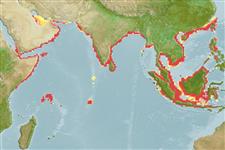Common names from other countries
>
Clupeiformes (Herrings) >
Engraulidae (Anchovies) > Engraulinae
Etymology: Stolephorus: Greek, stole, -es = garment + Greek, pherein = to carry (Ref. 45335).
Issue
Junior synonym Stolephorus baweanensis Hardenberg, 1933 is considered valid in CofF ver. 06 June 2023 following Hata et al., 2019 (Ref. 128121:11).
Environment: milieu / climate zone / depth range / distribution range
Ecologia
marinhas; estuarina; oceanódromo (Ref. 51243); intervalo de profundidade 0 - 50 m (Ref. 189). Tropical; 28°N - 9°S, 42°E - 123°E (Ref. 189)
Indo-Pacific: northern part of the Indian Ocean (Gulf of Aden, not Red Sea or the Persian Gulf, eastward to Burma) and western Pacific (Gulf of Thailand, Java Sea, also Hong Kong, Fujian and Taiwan Island; if correctly identified, then reaches to Fiji and Samoa) (Ref. 189). Mediterranean: Tel Aviv, Israel (Ref. 96660).
Length at first maturity / Tamanho / Peso / Idade
Maturity: Lm 4.3, range 6 - ? cm
Max length : 8.0 cm SL macho/indeterminado; (Ref. 1602)
Espinhos anais: 0; Raios anais moles: 17 - 20. Diagnosis: Body somewhat compressed, belly with 4-8 small needle-like pre-pelvic scutes; a small pre-dorsal spine in some specimens; maxilla tip pointed, reaching to or beyond hind border of pre-operculum, the latter concave, indented near maxilla tip; lower gillrakers 21 to 28; fine teeth on upper edge of hyoid bones; anal fin short, usually with 3 unbranched and 14-17 branched finrays, its origin below about middle of dorsal fin base; a double pigment line on back behind dorsal fin; tail deep yellow, at least in Indian specimens (Ref. 189). Of species with an indented pre-operculum, Stolephorus andhraensis has fewer gillrakers, 20-21, and S. ronquilloi has more gillrakers, 28-30; other species with a pre-dorsal spine also have a spine on the pelvic scute, like in S. dubiosus, S. baganensis and S. tri; hyoid tooth patches are present in S. commersonnii, but pre-operculum rounded, scutes usually 1-4, and in S. carpenteriae, but no pigment lines on back, anal origin under anterior part of dorsal fin base (Ref. 189).
Coastal pelagic (Ref. 68964). A schooling species occurring in coastal waters. More data needed based on correct identifications. The record from the Godavari estuary implies tolerance of lowered salinities, but the identity of the material is uncertain (perhaps S. waitei). Appears to be fairly common throughout its range. Used as bait in the tuna fishery in the South Pacific, although rather fragile.
Whitehead, P.J.P., G.J. Nelson and T. Wongratana, 1988. FAO Species Catalogue. Vol. 7. Clupeoid fishes of the world (Suborder Clupeoidei). An annotated and illustrated catalogue of the herrings, sardines, pilchards, sprats, shads, anchovies and wolf-herrings. FAO Fish. Synop. 125(7/2):305-579. Rome: FAO. (Ref. 189)
Categoria na Lista Vermelha da IUCN (Ref. 130435)
CITES (Ref. 128078)
Not Evaluated
Ameaça para o homem
Harmless
Utilização humana
Pescarias: espécies comerciais; isco: usually
Ferramentas
Relatórios especiais
Descarregue XML
Fontes da internet
Estimates based on models
Preferred temperature (Ref.
115969): 25 - 29.2, mean 28.5 (based on 816 cells).
Phylogenetic diversity index (Ref.
82804): PD
50 = 0.5000 [Uniqueness, from 0.5 = low to 2.0 = high].
Bayesian length-weight: a=0.00380 (0.00210 - 0.00687), b=3.15 (2.99 - 3.31), in cm Total Length, based on LWR estimates for this species & (Sub)family-body (Ref.
93245).
Nível Trófico (Ref.
69278): 3.3 ±0.4 se; based on size and trophs of closest relatives
Resiliência (Ref.
120179): Elevada, tempo mínimo de duplicação da população menor que 15 meses (K=1.61-20.8).
Fishing Vulnerability (Ref.
59153): Low vulnerability (10 of 100).
